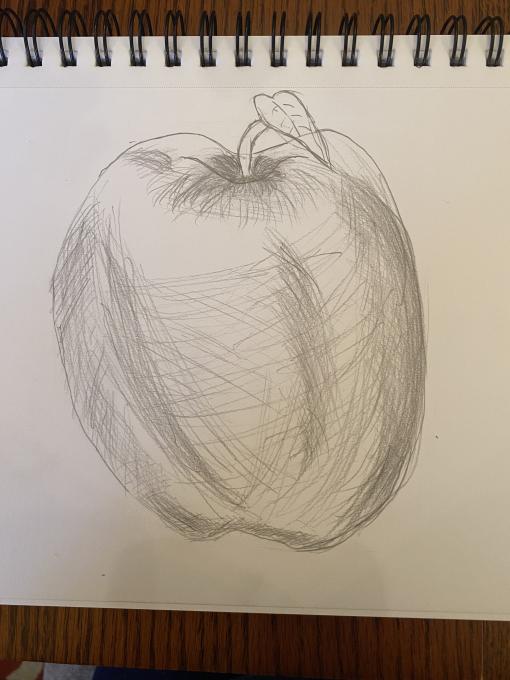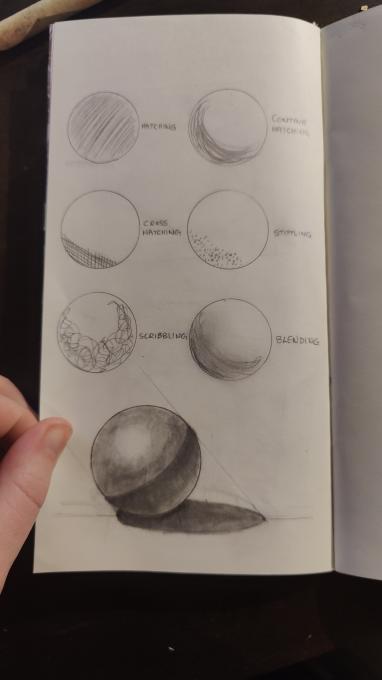The Cornell Lab Bird Academy › Discussion Groups › Nature Journaling and Field Sketching › Illustrating the 3D World
-
Bird AcademyBird AcademyAfter trying some of your new drawing skills, was it easy to see where and how each could be applied? Are you starting to feel more comfortable putting marks on the page? Which do you still want to work on?You must be enrolled in the course to reply to this topic.
-

-


-

-

-

-

-
Enjoyed the build up and practice with each technique. The squint up exercices really helped. For Chiascurro, I used to switch pencils (from H to 6-8B) to obtain darker tones, now, with practice, I kept the same pencil and achieved the light and dark effect. Happy! It will be much easier when I draw outdoor.


-
I need to practice more on all of these techniques How do I move to the nex t part? I don't see any link beyond "submit"
-
ElizabethBird AcademyHi Norma. You can choose which lesson to start or revisit by returning to the main Course Overview page at any time. By clicking “Expand All” you will be able to view the topics within each lesson. For additional help, please contact Customer Service. Happy journaling!
-
-
helpful
-
 As it's too cold outside, I'm still drawing indoors at the moment. But indoors I find it difficult with the light source. The daylight coming in from outside is rather diffuse. That's why I found it difficult to use the chiaroscuro technique correctly, even with an object as simple as this apple. I "cheated" the shadow, so to speak, because the apple didn't really cast a shadow. I also didn't see the reflected light beyond the darker area on the apple.
As it's too cold outside, I'm still drawing indoors at the moment. But indoors I find it difficult with the light source. The daylight coming in from outside is rather diffuse. That's why I found it difficult to use the chiaroscuro technique correctly, even with an object as simple as this apple. I "cheated" the shadow, so to speak, because the apple didn't really cast a shadow. I also didn't see the reflected light beyond the darker area on the apple. -
 I think I did fairly well on drawing these as 3 dimensional objects, but my values are too light, esp on the tomato and apple. The shadows were easier to see on the onion, since it had a shiny surface. The tomato was the most difficult for me as it was a deep red throughout and not uniformly spherical.
Drawing using short strokes is very helpful to me in trying to learn to sketch - but I need more practice with that and with distinguishing values. And with applying chiaroscuro to various shapes and combinations of shapes within one object.
I think I did fairly well on drawing these as 3 dimensional objects, but my values are too light, esp on the tomato and apple. The shadows were easier to see on the onion, since it had a shiny surface. The tomato was the most difficult for me as it was a deep red throughout and not uniformly spherical.
Drawing using short strokes is very helpful to me in trying to learn to sketch - but I need more practice with that and with distinguishing values. And with applying chiaroscuro to various shapes and combinations of shapes within one object.
-
I still need to work on this obviously. But I'm making slow progress.

-
 Trying this out on the imaginary sphere :-) and a seashell (two views).
Need to practice a bit, but an OK result. Could it be better... of course! but a good start.
Trying this out on the imaginary sphere :-) and a seashell (two views).
Need to practice a bit, but an OK result. Could it be better... of course! but a good start. -
 Cold out resorting to house plants again. Christmas cactus shading. Reasonable result but need to spend a bit more time on the details.
Tree out the window... hmmm. Ok but not great... making progress? :-)
Cold out resorting to house plants again. Christmas cactus shading. Reasonable result but need to spend a bit more time on the details.
Tree out the window... hmmm. Ok but not great... making progress? :-) -
 I want to practice a lighter touch with my pencil so the light areas are not blank but very light shading.
I want to practice a lighter touch with my pencil so the light areas are not blank but very light shading. -
 I can SEE how the skills can be applied, but I can't quite figure out how to get the ideas to work on the page. I tried to draw a grapefruit (that looks like a pomegranate) and could see the light and dark spaces. I also noticed how many little dots there are on a grapefruit I had never seen before. I used stippling to capture that effect and tried to use the highlight, light, and shadow to capture the light and dark. Although I feel more comfortable putting marks on the page, I have a long way to go.
I can SEE how the skills can be applied, but I can't quite figure out how to get the ideas to work on the page. I tried to draw a grapefruit (that looks like a pomegranate) and could see the light and dark spaces. I also noticed how many little dots there are on a grapefruit I had never seen before. I used stippling to capture that effect and tried to use the highlight, light, and shadow to capture the light and dark. Although I feel more comfortable putting marks on the page, I have a long way to go. -
Using shading on a fairly light colored object threw me off a bit but I am reasonably happy with the result here with the mostly whitish seashell.
 This quick detail of the Christmas cactus seems a bit sparse without color, but is OK for starters.
This quick detail of the Christmas cactus seems a bit sparse without color, but is OK for starters. I cheated a bit on these other images as they were drawn from imagination rather than from 'life' ... but I am happy with the outcome.
I cheated a bit on these other images as they were drawn from imagination rather than from 'life' ... but I am happy with the outcome.
-
I was pretty happy I could even draw the apple (bottom left). I can see how practice will make this much better. Squinting really helped me see the light in dark when it wasn't obvious. It also made me see I had two light sources; one large window to the right and a smaller reflective light from smaller window on the left. I need to practice with lightest shading, I seem to have a heavy hand.

-

 Chiaroscuro was eye opening! A great skill to learn. The shell was difficult, though, to show both the highlight on the top left side and also the protruding eye in the center. Looking forward to applying more new techniques.
Chiaroscuro was eye opening! A great skill to learn. The shell was difficult, though, to show both the highlight on the top left side and also the protruding eye in the center. Looking forward to applying more new techniques. -
 I am glad I tried it!
I am glad I tried it! -
 I need practice!
I need practice! -
I'm feeling a bit more comfortable with each new drawing. I need to work on quite a bit. Dimension; light; finding the curves and shape of the object. But it's coming.

-
Always good to revisit the basics of light and shadow! I have always struggled with making shapes look like shapes. What helped me the most here was my husband teaching me about the terminator line. That is the point on the object past which the original light source does not shine. It will be the darkest line on the object, and the gradient of shadows behind it will be all darker than the darkest shadow on the lit side.

-
This was a helpful comment. Thank you.
-
-
I am fairly new to sketching and drawing and would like to know more about various methods of filling in subjects(ie. use of crosshatching or tippling). These are new things that I don't know about and would like to see this included in the course material.
Read More:
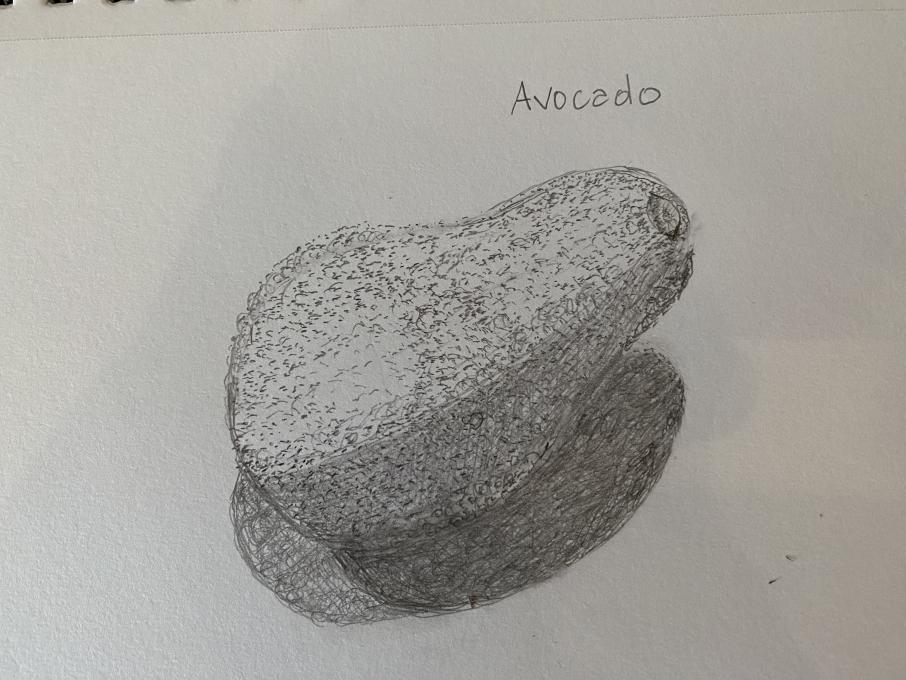
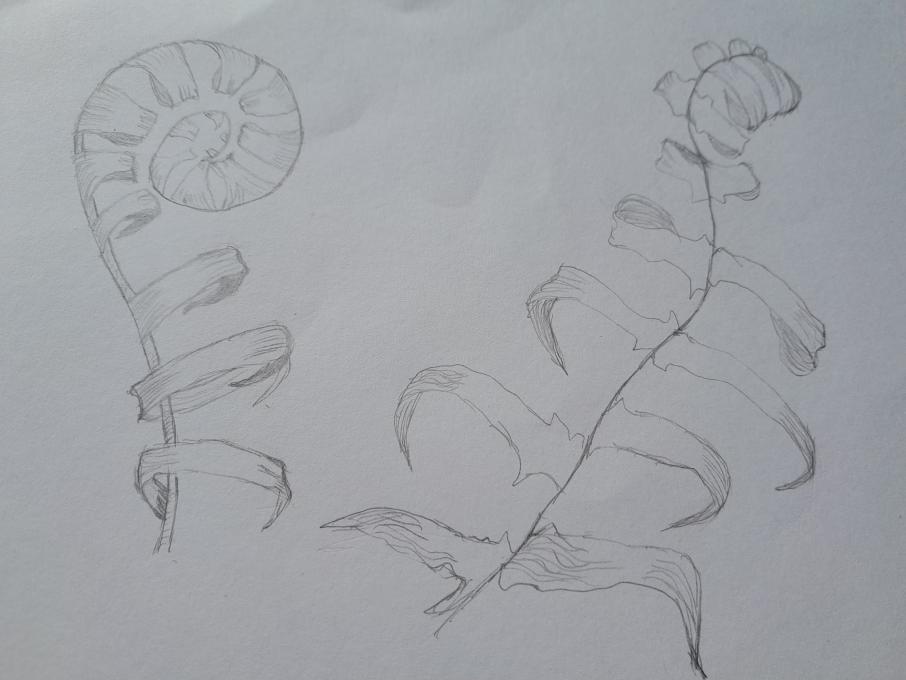
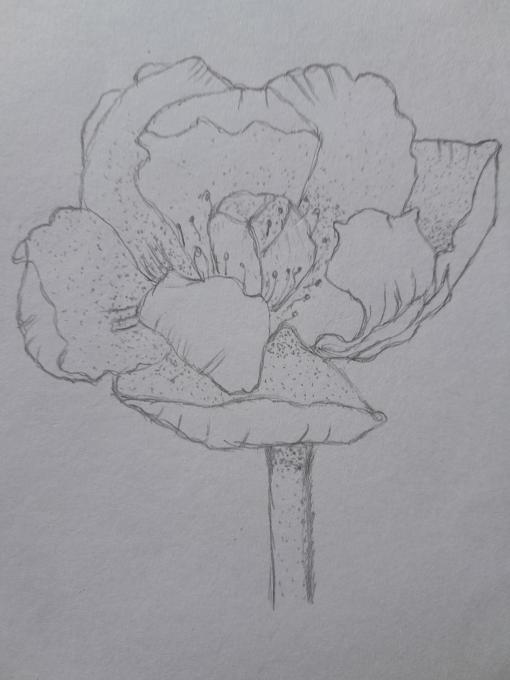
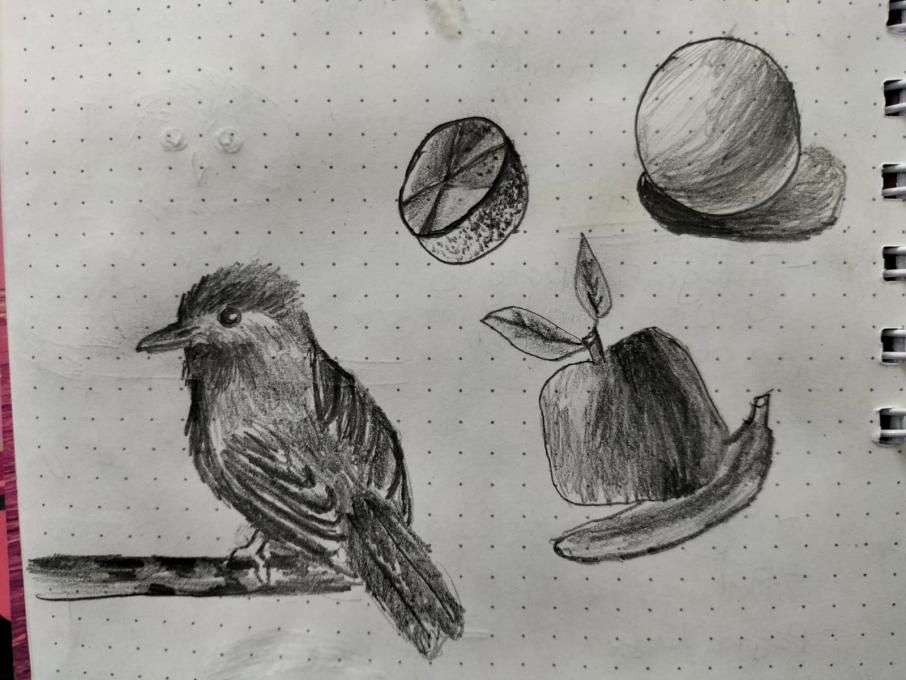
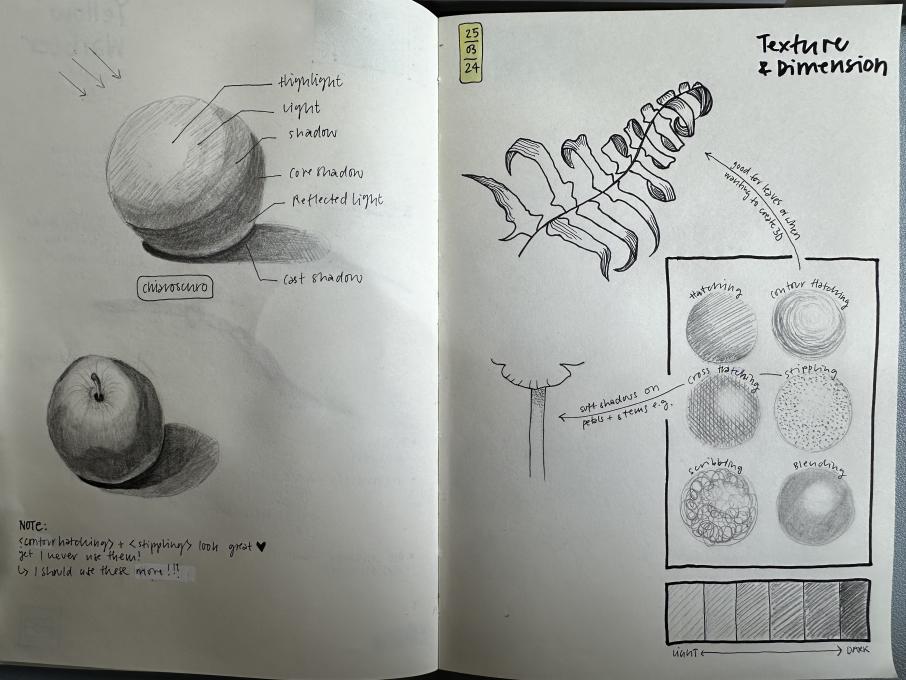
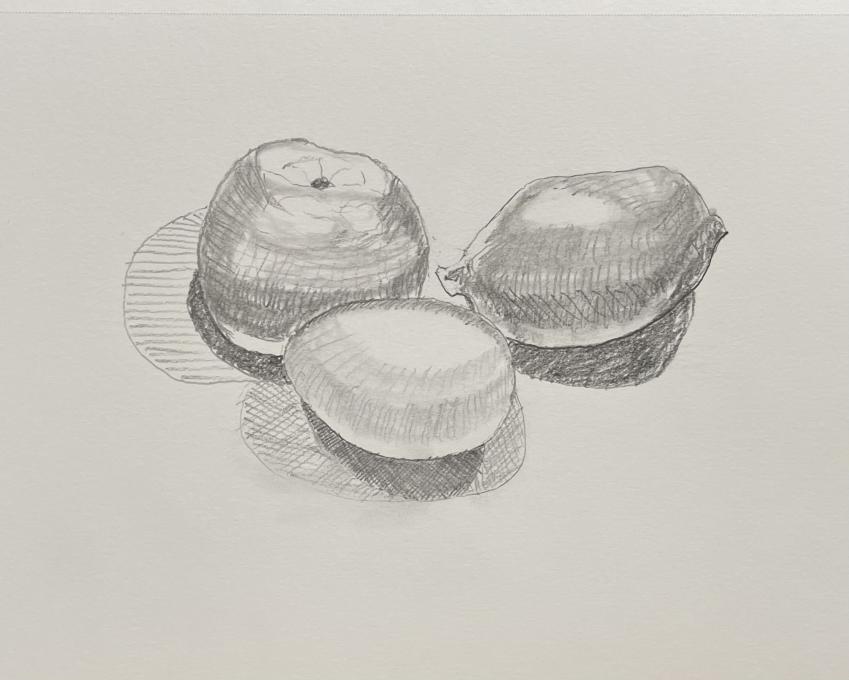
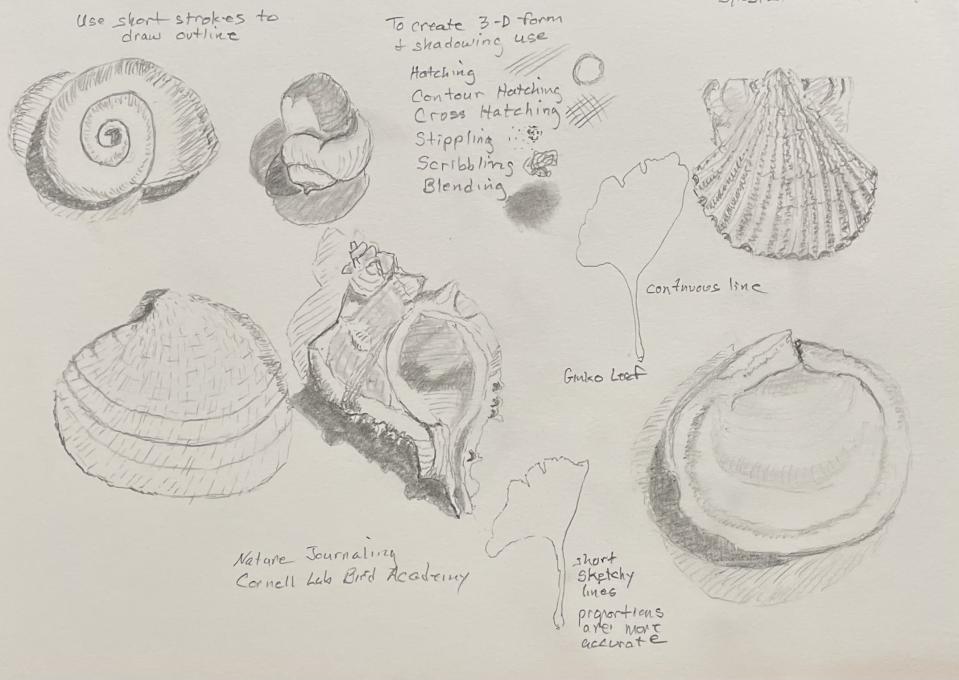
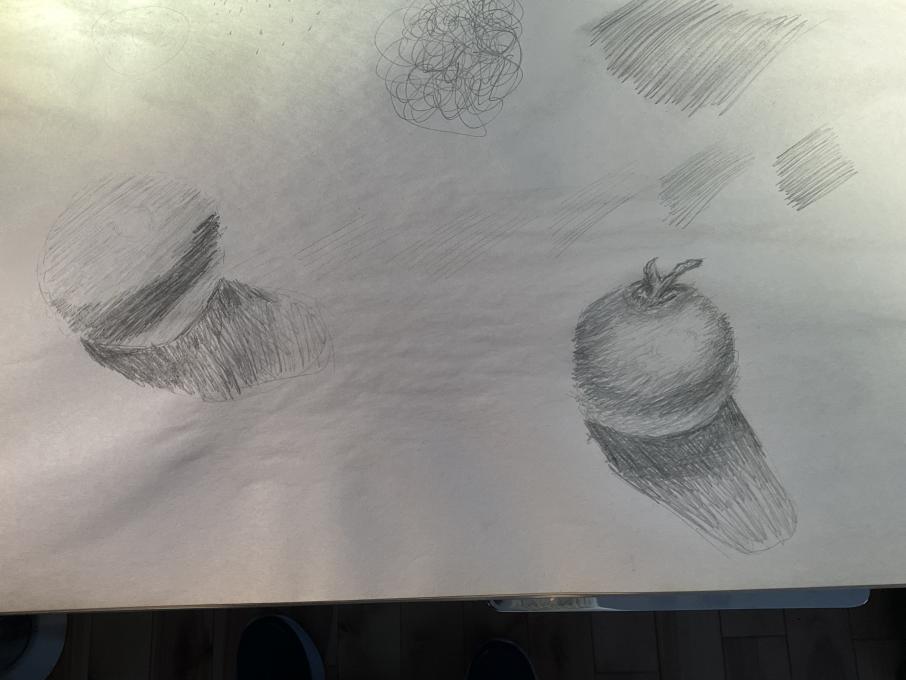
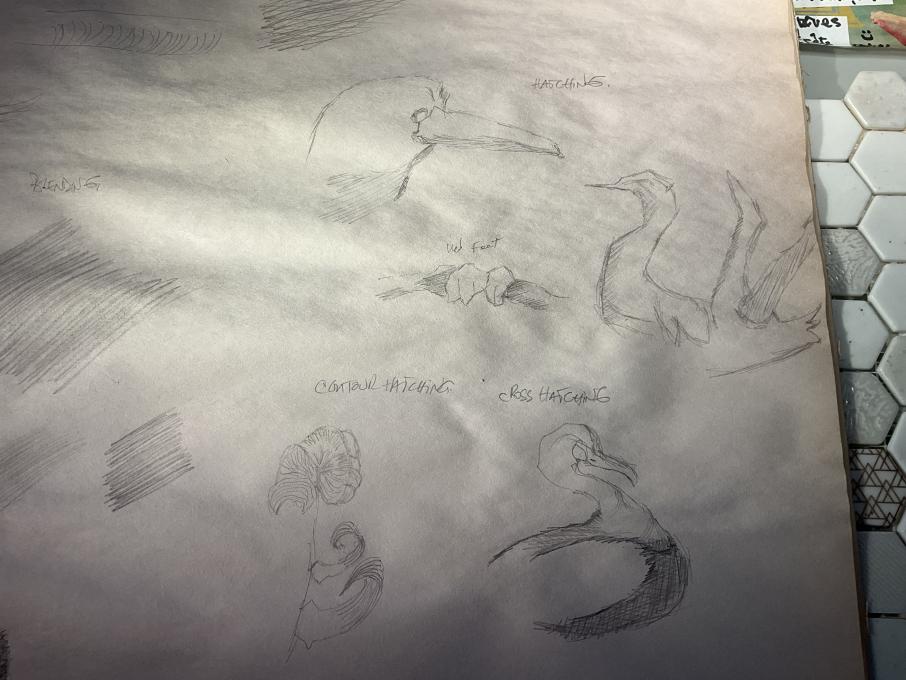
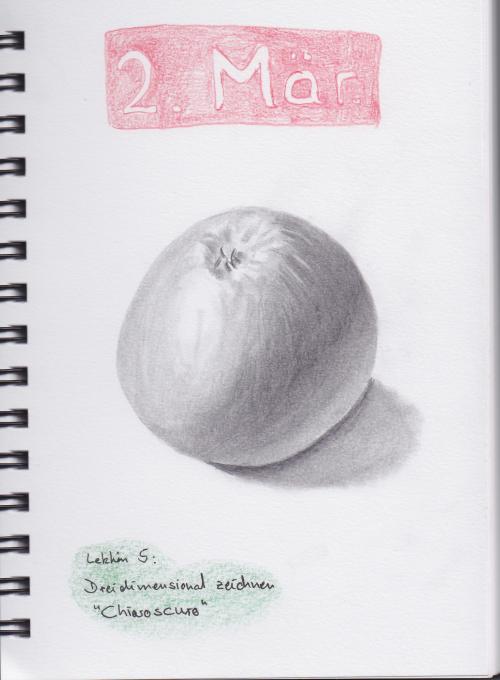 As it's too cold outside, I'm still drawing indoors at the moment. But indoors I find it difficult with the light source. The daylight coming in from outside is rather diffuse. That's why I found it difficult to use the chiaroscuro technique correctly, even with an object as simple as this apple. I "cheated" the shadow, so to speak, because the apple didn't really cast a shadow. I also didn't see the reflected light beyond the darker area on the apple.
As it's too cold outside, I'm still drawing indoors at the moment. But indoors I find it difficult with the light source. The daylight coming in from outside is rather diffuse. That's why I found it difficult to use the chiaroscuro technique correctly, even with an object as simple as this apple. I "cheated" the shadow, so to speak, because the apple didn't really cast a shadow. I also didn't see the reflected light beyond the darker area on the apple. 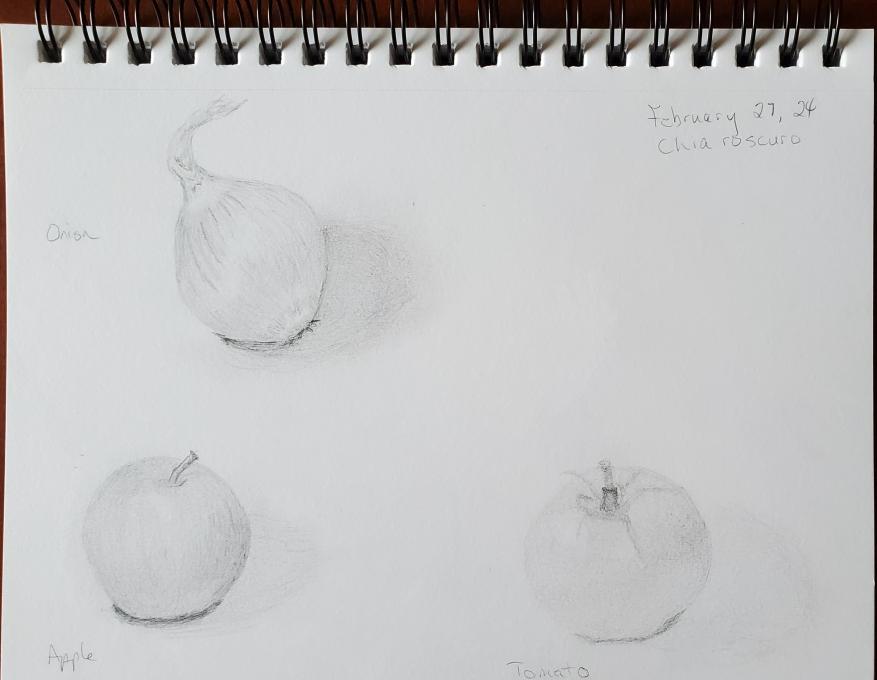 I think I did fairly well on drawing these as 3 dimensional objects, but my values are too light, esp on the tomato and apple. The shadows were easier to see on the onion, since it had a shiny surface. The tomato was the most difficult for me as it was a deep red throughout and not uniformly spherical.
Drawing using short strokes is very helpful to me in trying to learn to sketch - but I need more practice with that and with distinguishing values. And with applying chiaroscuro to various shapes and combinations of shapes within one object.
I think I did fairly well on drawing these as 3 dimensional objects, but my values are too light, esp on the tomato and apple. The shadows were easier to see on the onion, since it had a shiny surface. The tomato was the most difficult for me as it was a deep red throughout and not uniformly spherical.
Drawing using short strokes is very helpful to me in trying to learn to sketch - but I need more practice with that and with distinguishing values. And with applying chiaroscuro to various shapes and combinations of shapes within one object.
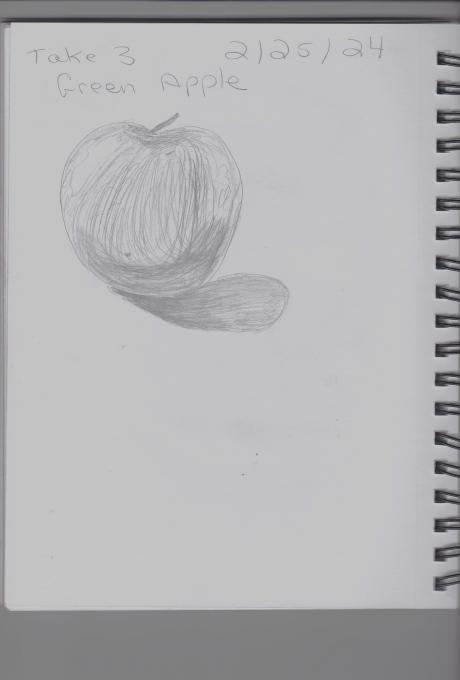
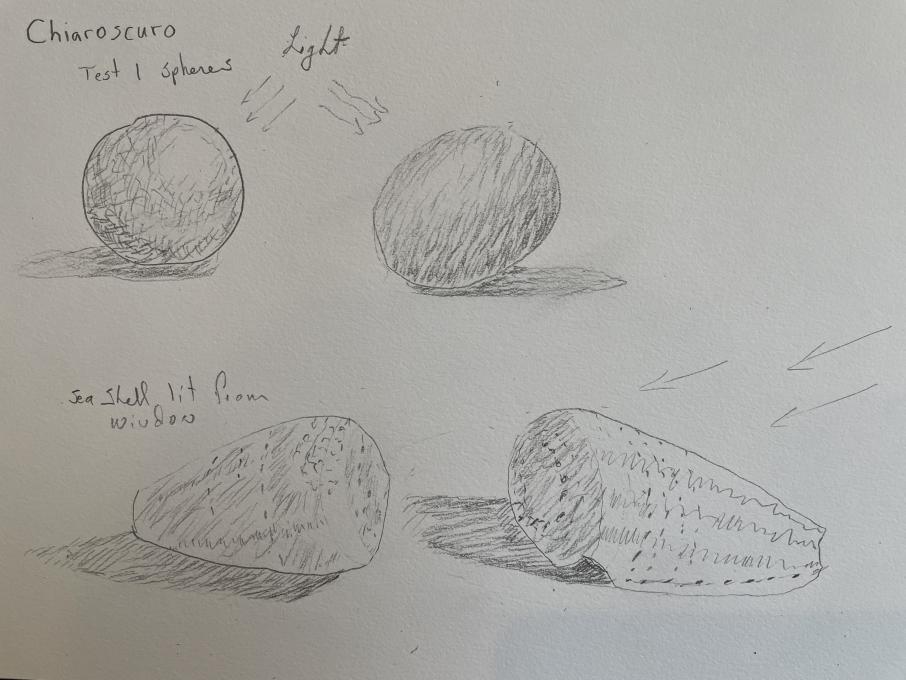 Trying this out on the imaginary sphere :-) and a seashell (two views).
Need to practice a bit, but an OK result. Could it be better... of course! but a good start.
Trying this out on the imaginary sphere :-) and a seashell (two views).
Need to practice a bit, but an OK result. Could it be better... of course! but a good start. 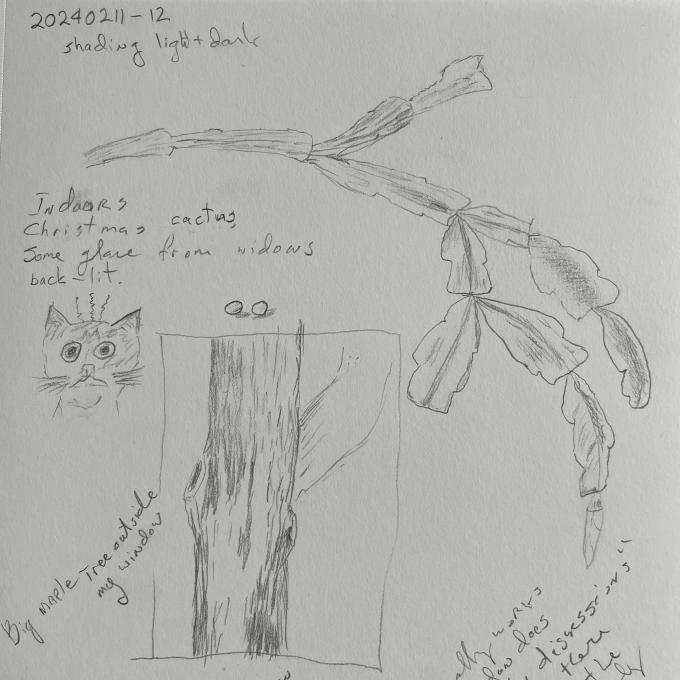 Cold out resorting to house plants again. Christmas cactus shading. Reasonable result but need to spend a bit more time on the details.
Tree out the window... hmmm. Ok but not great... making progress? :-)
Cold out resorting to house plants again. Christmas cactus shading. Reasonable result but need to spend a bit more time on the details.
Tree out the window... hmmm. Ok but not great... making progress? :-) 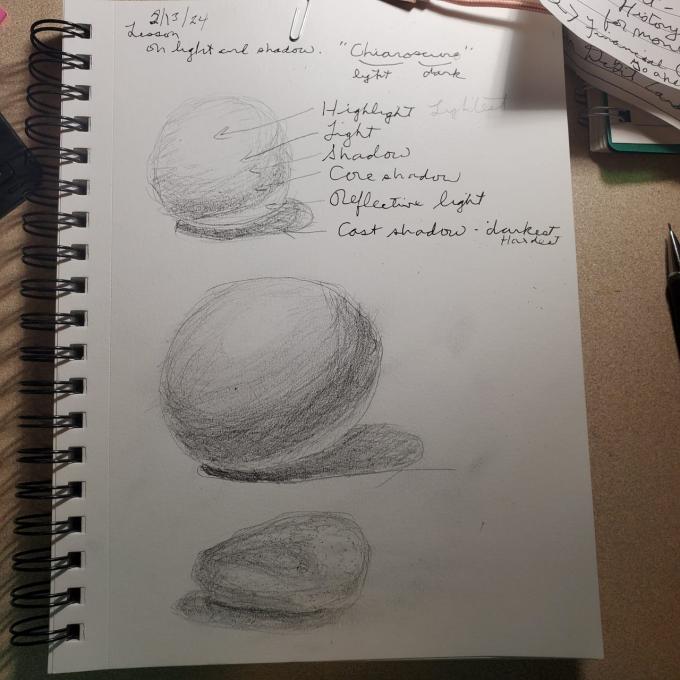 I want to practice a lighter touch with my pencil so the light areas are not blank but very light shading.
I want to practice a lighter touch with my pencil so the light areas are not blank but very light shading. 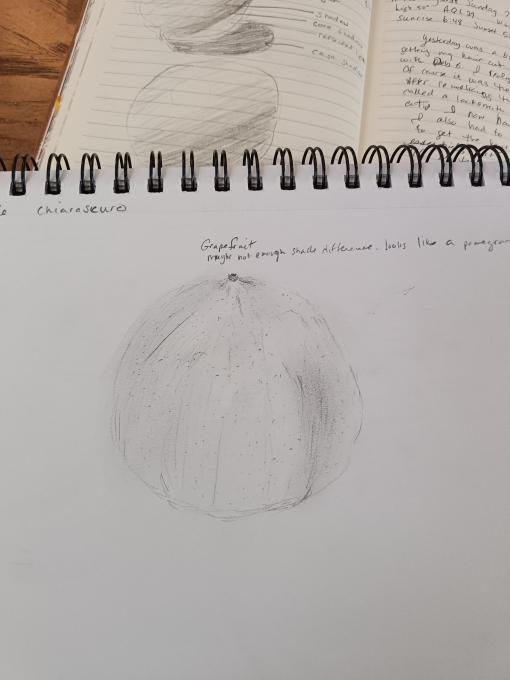 I can SEE how the skills can be applied, but I can't quite figure out how to get the ideas to work on the page. I tried to draw a grapefruit (that looks like a pomegranate) and could see the light and dark spaces. I also noticed how many little dots there are on a grapefruit I had never seen before. I used stippling to capture that effect and tried to use the highlight, light, and shadow to capture the light and dark. Although I feel more comfortable putting marks on the page, I have a long way to go.
I can SEE how the skills can be applied, but I can't quite figure out how to get the ideas to work on the page. I tried to draw a grapefruit (that looks like a pomegranate) and could see the light and dark spaces. I also noticed how many little dots there are on a grapefruit I had never seen before. I used stippling to capture that effect and tried to use the highlight, light, and shadow to capture the light and dark. Although I feel more comfortable putting marks on the page, I have a long way to go. 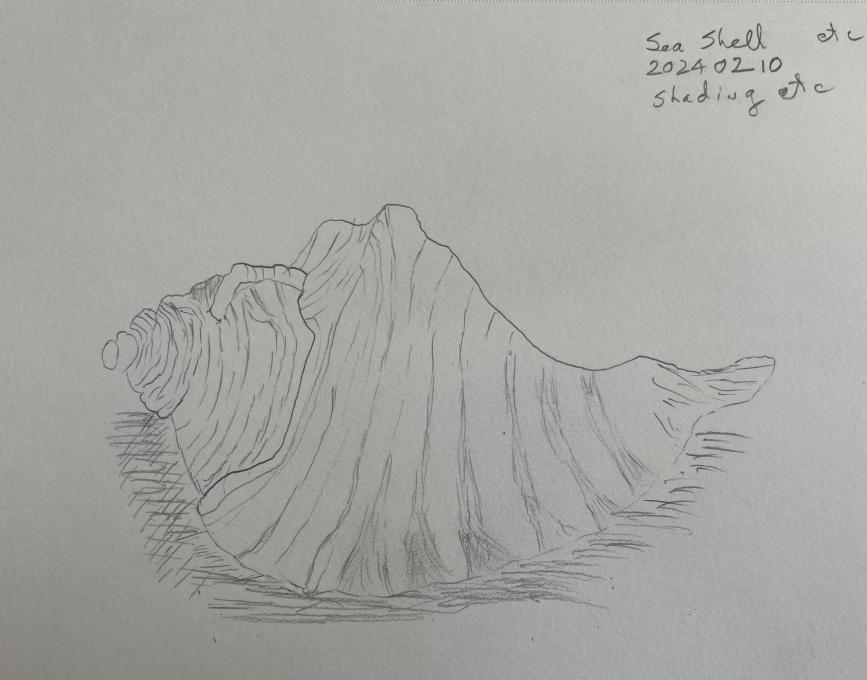 This quick detail of the Christmas cactus seems a bit sparse without color, but is OK for starters.
This quick detail of the Christmas cactus seems a bit sparse without color, but is OK for starters.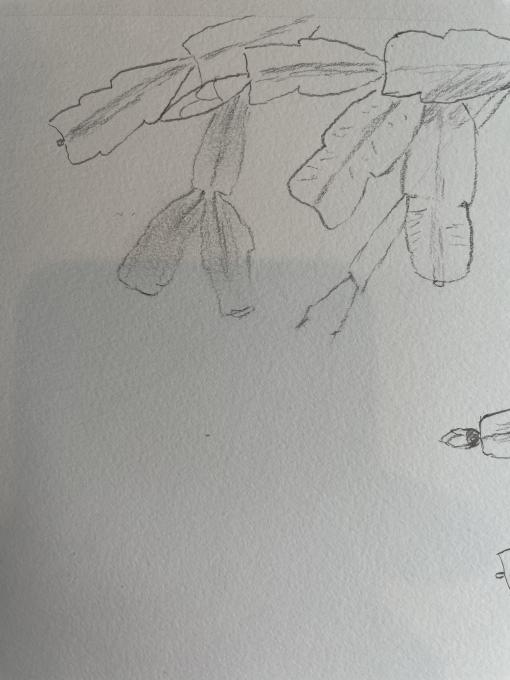 I cheated a bit on these other images as they were drawn from imagination rather than from 'life' ... but I am happy with the outcome.
I cheated a bit on these other images as they were drawn from imagination rather than from 'life' ... but I am happy with the outcome.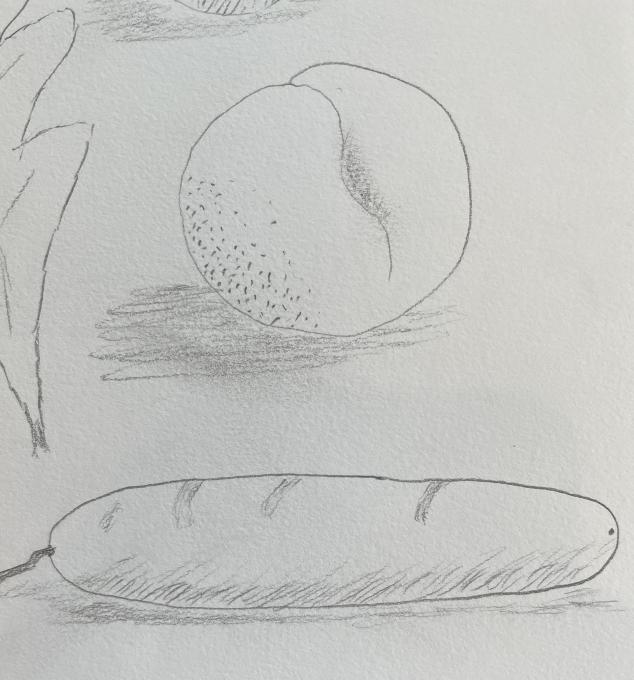
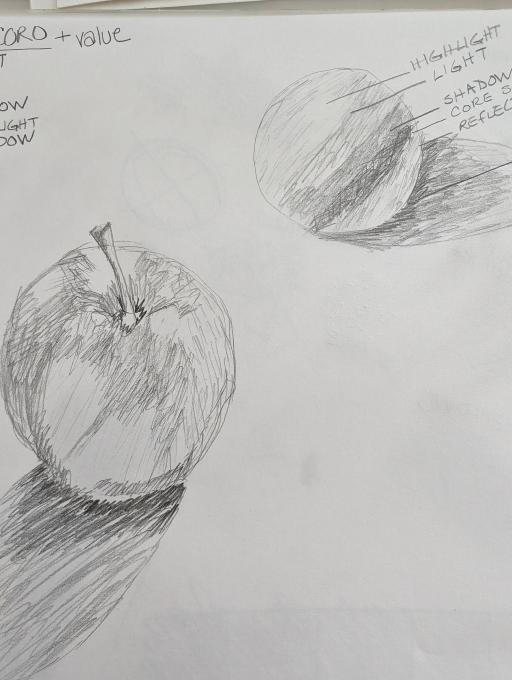
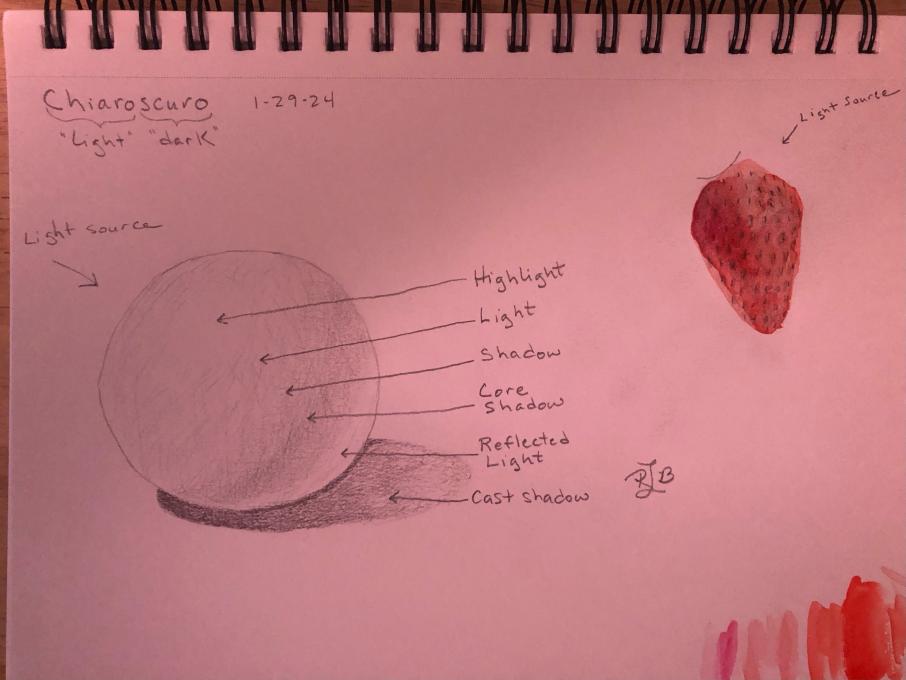
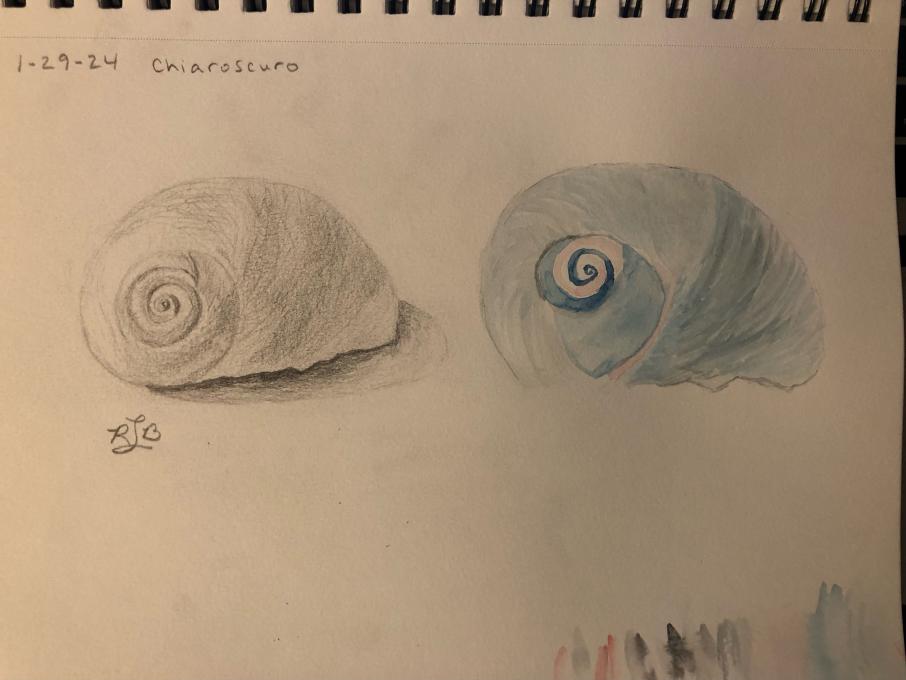 Chiaroscuro was eye opening! A great skill to learn. The shell was difficult, though, to show both the highlight on the top left side and also the protruding eye in the center. Looking forward to applying more new techniques.
Chiaroscuro was eye opening! A great skill to learn. The shell was difficult, though, to show both the highlight on the top left side and also the protruding eye in the center. Looking forward to applying more new techniques. 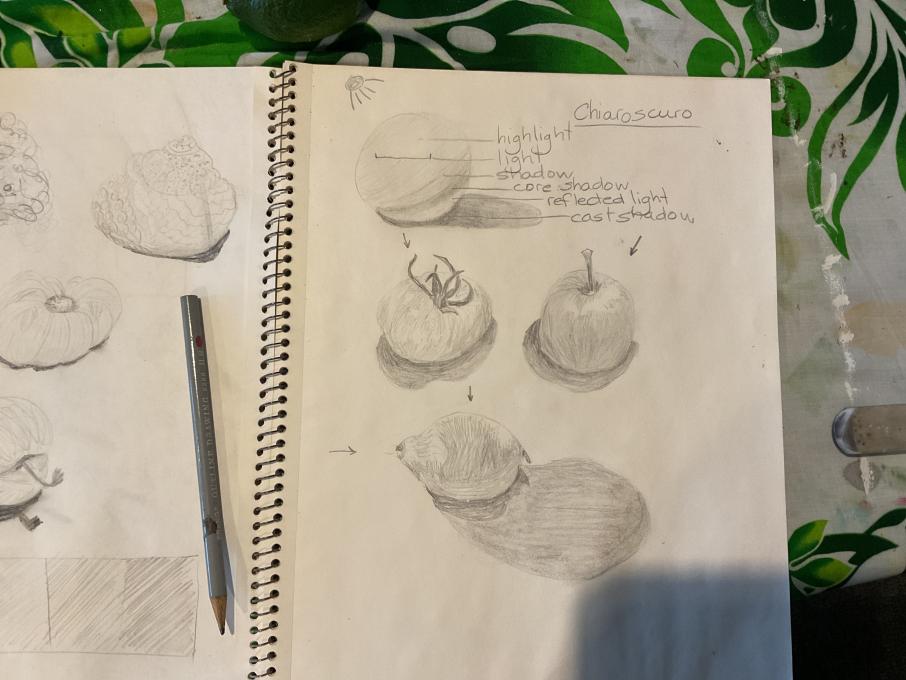 I am glad I tried it!
I am glad I tried it! 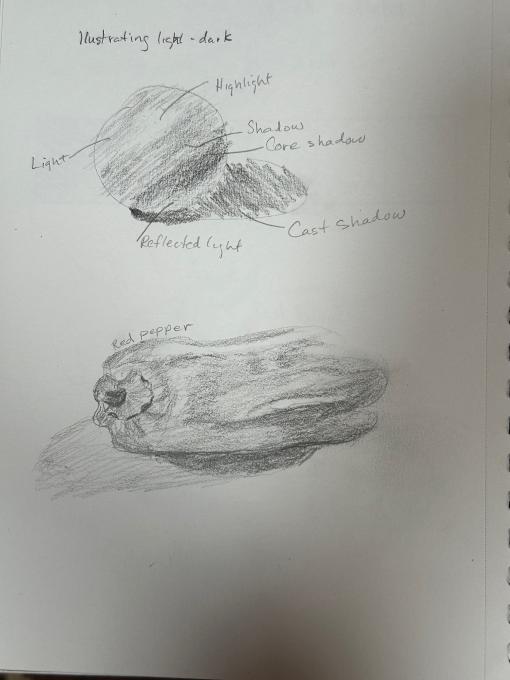 I need practice!
I need practice! 